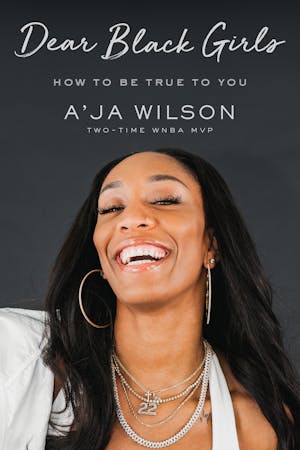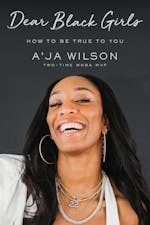1IT ALL STARTED WITH A BIRTHDAY PARTY
Dear Black Girls,
This one is for all the girls with an apostrophe in their names.
This is for all the girls who are labeled “too loud” and “too emotional.”
This is for all the girls who are constantly asked, “Oh, what did you do with your hair? That’s new.”
This is for my Black girls.
Let me tell you a story, and maybe you can relate. It all started with a birthday party. (How come it feels like so much drama always happens at birthday parties?!?!)
I was in the fourth grade in Hopkins, South Carolina. A place where the Confederate flag was still seen around every corner. Hanging up in restaurants, front lawns, on bumper stickers—hell, they even flew it proudly over our State House at one point. It was just a thing you saw everywhere. And this was not ancient history, mind you. This was 2006. The iPhone was coming out, and they were still flying a symbol of hate everywhere you looked down South.
When you’re a kid, you don’t really get it. The world is a friendly place, right? You take what people say at face value. Your friends are your friends. When you’re young, you are who you are. You love what you love. People are just people. It’s all good! Right?
Right?
I was always able to learn better in small classrooms, so my parents sent me to this private school called Heathwood Hall. It was probably 10 percent Black at the time, so most of my friends were white. Didn’t think anything of it. We had our little crew that was inseparable. So then one of my friends’ birthdays rolls around, and it was a whole thing at school. Everyone was like, “Ohmygod, did you hear about so-and-so’s party? I’m so going!”
One day, out of the blue, so-and-so pulls me aside in the hallway, and she says, “Hey, you’re coming to my party, right?”
And I’m like, “Yeah!”
She’s like, “You know it’s a sleepover, right?”
I’m like, “Yeah! I can’t wait!”
Then she drops the bomb on me. She says, “Well, you might have to sleep outside.”
And I’m like, “Outside? What are we talking about—camping? We going to the mountains? Do I need some cute hiking boots or something?”
And she’s like, “No, the party’s at my house. But the thing is … my dad doesn’t really like Black people.”
So …
I was just staring at her like … huh?
It was so matter of fact. It wasn’t dramatic. It was just blunt.
It didn’t seem real. I mean, this is my friend! This is my girl! It ain’t nothing else! This was not some friend-of-a-friend situation. This was not some mean-girl-in-class situation. This was my true friend. We did almost everything together.
It was so sad but so important to learn that lesson at such a young age. Because it was the first time I realized: Oh, OK, you’re not just a girl. You’re a Black girl. And some people don’t like you because of that.
I was crushed. It felt like I had aged ten years in that one moment. I went from this happy-go-lucky kid, trusting everybody, thinking the world had my back, to this adult who realized there was darkness in the world.
The worst part was going home and telling my parents what happened. Seeing the looks on their faces. I’d never seen them react like that. They were so hurt. So upset.
But my parents were great about it. Wait, what am I saying? Let me be real. My dad? He might’ve been pacing around saying, “Oh HELL no. These white folks are playing with my daughter? I’m gonna go down to that school and…”
He kind of snapped—I’m not gonna lie. And this is going to sound crazy to some people, but maybe some of you can relate.
My first reaction was to retreat within myself and not exactly blame myself for what happened, but I was actually most worried about making a big deal out of it and losing my friend.
I was like, “Please don’t tell the school anything. Please don’t tell the other parents. Don’t embarrass me. Maybe she didn’t mean it.”
My mom always keeps it real with me. Her message was simple:
You are a Black girl in America. That’s the reality. When you walk into a room, they’re going to see you as Black before they see anything else. Not everything that glitters is gold, baby. Some people are going to smile right in your face and make you think they’re your friend, and then talk about you behind your back. Some people are going to tell you straight to your face that they don’t like you. And some people are truly going to love you no matter what. A’ja, we love you.
She gives it to me straight, always.
Then she said, “Forget about that stupid birthday party. Just keep being you—through and through.”
For the first few weeks afterward? Honestly? It was so hard to keep being A’ja. Before the birthday party, I don’t think I even knew that the cliché meant, “Just be yourself.”
Who else would I be?
It never occurred to me that people would pretend to be something they weren’t or pretend to like somebody when they don’t. I was just always right there in the moment, with my friends, having fun. “A’ja” was what was in my mind and in my heart and all the things that I loved. That was what defined me, not the color of my skin. Until that birthday party came around, and my safe little bubble popped.
Eventually, the world steps in and reminds you: You have a body. You are Black. You are a woman. Whether you like it or not, that’s the first thing people see.
Your mission, Black girls, is to accept that reality.
Don’t look away from it.
Don’t hide from it.
But you can accept this reality without letting it steal your joy. You can acknowledge it without losing your positivity and your kindness and your ambition. You don’t have to let a cold world turn you cold.
No one’s story is exactly the same. But every Black girl, at some point in her life, has her own version of The Birthday Party. As you get older, go to college, or start your first job, or you step into your first boardroom, you have more and more “Birthday Parties.” Oh yes, you’ll never stop having them.
No matter how well you think you know the game, there will always be those little moments when you are reminded about the way people see Black women in our society, and I can’t lie to you—it will take your breath away every time.
That’s why I’m writing this book. I know what it’s like to feel like you’ve been swept under the rug. I know what it feels like to not be heard, not be seen, not be taken seriously.
And then when you finally do raise your voice … what do they call you?
“Loud.”
“Angry.”
“Difficult.”
“Ghetto.”
Sometimes, it feels like you can’t win, right? Well, all I’m here to tell you is that I hear you. You are not alone, just know that.
I FEEL YOU.
The truth is, we’re a double minority. It’s like the world is constantly reminding us.…
You’re a girl.
Oh! And you’re a Black girl.
Alright, good luck!
When I was growing up, the hardest part for me was when I looked around, I didn’t see any adult role models who looked like me. All my teachers—shout-out to them, most of you were amazing—were white. Well, except one. We had one Black female teacher in the entire school. I’ll give you five seconds to guess what all the kids called her.
One …
Two …
Three …
“The mean one.”
You got it. You already know the story. She was the scary one. Most of the kids and their parents had probably never even met the woman, but if her name was ever mentioned, it was always this passive-aggressive, “Ohhhhh, you don’t wanna go to that class. That’s an awful class. No, no, no. That teacher is a handful.”
If they were talking about Mr. So-and-So, who had been there for over forty years, it was a whole different vibe. Now it was, “Oh, Mr. So-and-So is old school. He’s a legend. Don’t be talking back to him. He’s tough, but he’s fair.”
It was an introduction to the way the world works for Black women. And let me tell you, it was a lesson that I never stopped learning, even when I went to play basketball at the University of South Carolina for the living legend Dawn Staley.
Now, Coach is like my second mom, so I’m going to be a little bit biased. Just a warning. I’m going to go off a bit here. But I feel like you already get the vibe of this book, right? I’m here to tell you nothing but the unapologetic truth—so … sorry, not sorry.
It seems like no matter how successful you are, or how strong, or how many lives you’ve changed, or how many banners you’ve got hanging.…
If you’re a Black woman in this country, especially in the South?
It’s always this vibe of, “I’m going to tell the real boss on you. Where’s your manager? I want to speak to the manager’s manager.”
Of course, Coach Staley is the real boss. You’re talking about a woman who won three Olympic gold medals for our country. You’re talking about a six-time WNBA All-Star. You’re talking about a Naismith winner as a player and a coach.
She’s the ultimate boss.
And yet, I’ve still seen them pull that card on her, too. Nobody is exempt! When we won the NCAA Championship in 2017, you know what we heard almost immediately? Remember, we’re talking about the first women’s basketball championship in the state of South Carolina. We had all the pastors letting church out early on Sundays so people could come see us play. We packed out the arena every week for women’s basketball. We put the university back on the map on a national stage. We had made the whole state proud. Right?
Right?
For some people, that wasn’t what it was about. Do you know what they were saying—almost before we could even get the banner up in the rafters?
“Coach Staley doesn’t recruit white players. What’s her problem? Why doesn’t she recruit our white girls?”
You had a team of twelve Black girls working their tails off. No, working their asses off. To achieve history. Under a Black female head coach. And it still felt like a significant part of our community didn’t want to celebrate it fully. On social media, it was the worst. Pure hatred. Pure nonsense. But I don’t know, maybe all that hate was coming from down the road at Mississippi State, because we sure did beat y’all a lot!!
Hey, I’m just keeping it unapologetic!
I warned you!
At the end of the day, Black girls all across the country need to hear the truth. I feel like we’ve been hearing a lot of half-truths these last few years. They’re giving us a little taste. From the corporations, to the schools, to the sports leagues, to the politicians, to the shows we see on TV. We’re getting the PG-13, corporate-approved version of The Racial Reckoning. They keep telling us they want everyone to have uncomfortable conversations, but then why does it all feel so comfortable?
Copyright © 2024 by A’ja Wilson





